商学部(塾外用) - 慶應義塾大学-塾生HP
商学部(塾外用) - 慶應義塾大学-塾生HP
商学部(塾外用) - 慶應義塾大学-塾生HP
Create successful ePaper yourself
Turn your PDF publications into a flip-book with our unique Google optimized e-Paper software.
expected to appreciate the impact of forces for global integration, national<br />
responsiveness, and worldwide learning on strategic, organizational and<br />
managerial decision-making. They are also expected to experiment that<br />
there is no easy and clear answer to globalization issues. Firms do<br />
internationalize by trial-and error processes.<br />
The methods used in this course are mostly based on interactivity and<br />
class participation. The course will consist of case discussions,<br />
supplemented with conceptual insights and oral debates on specific issues<br />
raised.<br />
Textbooks:<br />
Dereski, Helen (2007). International management : Managing across<br />
Borders and Cultures. 6th edition. Pearson Prentice Hall. ISBN:<br />
0-321-02829-5<br />
Reference Books:<br />
1. Bartlett, Christopher A. and Ghoshal, Sumantra (2002). Managing<br />
across Borders : the Transnational Solution. 2nd edition. Harvard<br />
Business School Press. ISBN:0-87584-849-4<br />
2. Dunning, John H. and Lundan, Sarianna M. (2008). Multinational<br />
Enterprises and the Global Economy. 2nd edition. Edward Elgar<br />
Publishing. ISBN:1847201229<br />
3. Lane, Henry W. et alii. (2009). International Management Behavior:<br />
Leading with a Global Mindset. 6th edition. Wiley John & sons. ISBN:<br />
0470714123<br />
LECTURE SERIES ON EUROPEAN AND ASIAN ECONOMICS<br />
2credits (Fall)<br />
Lecture Series on European and Asian Economic<br />
s 2単位 (秋学期)<br />
Professor, Faculty of Economics KIMURA, FUKUNARI<br />
Professor, Faculty of Economics MCKENZIE, COLIN R.<br />
経済学部教授 木村 福成<br />
経済学部教授 マッケンジー, コリン R<br />
Course Description:<br />
This class is financially supported by the Global 30 Fund of the<br />
Ministry of Education, Culture, Sports, Science and Technology<br />
(MEXT). Each week, a speaker will be invited from outside the Faculty<br />
of Economics at Keio University, to lecture in English. The lectures will<br />
be on recent developments and pressing issues related to Asia and/or<br />
Europe. The speakers will be invited from around the world, including<br />
Japan.<br />
Textbooks:<br />
There is no textbook for this class, but individual speakers may provide<br />
suggestions for further reading for their class<br />
NEW CHALLENGES FOR THE JAPANESE ECONOMY<br />
2credits (Spring)<br />
NEW CHALLENGES FOR THE JAPANESE ECON<br />
OMY 2単位 (春学期)<br />
From the Perspective of Practitioners<br />
Professor, Faculty of Economics GREVE, TAKAKO<br />
Professor, Faculty of Economics NAKAMURA, SHINSUKE<br />
Guest Professor, Faculty of Economics<br />
KOBAYASHI, KEIICHIRO<br />
経済学部教授 グレーヴァ 香子<br />
経済学部教授 中村 慎助<br />
経済学部特別招聘教授 小林 慶一郎<br />
(プライスウォーターハウスクーパース株式会社寄附講座)<br />
Course Description:<br />
The objective of this course is to discuss most up-to-date topics of<br />
Japanese economy, its problems and future perspectives. We invite<br />
prominent Japanese and international practitioners to give lectures and<br />
lead the discussion with students.<br />
Textbooks:<br />
None.<br />
Reference Books:<br />
To be announced in the class.<br />
88<br />
THEORY AND PRACTICE OF NATIONALISM 2credits (Fall)<br />
ナショナリズム研究 2単位 (秋学期)<br />
Lecturer CHANDRA, ELIZABETH<br />
講師 チャンドラ, エリザベス<br />
Course Description:<br />
This course aims to familiarize students with existing scholarship in the<br />
study of nationalism. It focuses on the theoretical questions regarding the<br />
formation of nations such as: Where do we locate the conceptual origin(s)<br />
of the nation? Is it really, as many scholars maintain, a modern creation?<br />
What are the ingredients that go into the making of a nation? How do we<br />
make sense of the nation from the point of view of gender? Is the nation<br />
ultimately a masculine project? In the age of globalization and world<br />
economy, has nation-state become obsolete? Do we have alternatives?<br />
The course is designed to be an interdisciplinary undertaking as we will<br />
deal with writings by historians, political scientists, philosophers, and<br />
novelists. Students will be encouraged to bring into discussions their own<br />
experience with nationalism in their country.<br />
Textbooks:<br />
1) Omar Dahbour & Micheline Ishay (eds.), The Nationalism Reader<br />
(Humanity, 1995)<br />
2) Geoff Eley & Ronald Suny (eds.), Becoming National: A Reader<br />
(Oxford Univ. Press, 1996)<br />
3) John Hutchinson & Anthony Smith (eds.), Nationalism (Oxford Univ.<br />
Press, 1995)<br />
Reference Books:<br />
1) Benedict Anderson, Imagined Communities (Verso, 2006)<br />
2) Anthony Smith, Nationalism: Theory, Ideology, History (Polity, 2002)<br />
3) Eric Hobsbawm, Nation and Nationalism since 1780 (Cambridge Univ.<br />
Press, 2000)<br />
4) Ernest Gellner, Nations and Nationalism (Cornell UP, 1983)<br />
5) Tom Nairn, Faces of Nationalism (Verso, 1998)<br />
6) Gopal Balakrishnan (ed.), Mapping the Nation (Verso, 1996)<br />
7) Partha Chatterjee, Nationalist Thought and the Colonial World (Univ.<br />
of Minnesota Press, 1993)<br />
8) George Mosse, Nationalism and Sexuality (Howard Fertig, 1997)<br />
9) John Gillis (ed.), Commemorations (Princeton Univ. Press, 1996)<br />
10) Tessa Morris-Suzuki, Re-inventing Japan: Time, Space, Nation<br />
(Sharpe, 1998)<br />
DISCOVERING CULTURE THROUGH OBSERVATION<br />
2credits (Spring)<br />
文化観察による発見と理解 2単位 (春学期)<br />
Doing Observational/Ethnographic Studies to Understand Culture<br />
観察研究により文化理解を深める<br />
Lecturer YOKOKAWA, MARIKO<br />
講師 横川 真理子<br />
Course Description:<br />
When one encounters different behaviors and assumptions in a different<br />
culture, often the immediate reaction is one of irritation and confusion.<br />
“What is wrong with THESE people?”, "Why do they do that?", we ask.<br />
Actually, people in a particular society are behaving according to patterns<br />
that make sense within the larger framework of their culture. This course<br />
is designed to discover those patterns through conducting observational/<br />
ethnographic studies on the behavior of people in different settings.<br />
After explaining the concepts of culture and subculture, the methods<br />
used in observational studies will be introduced. Students will be given an<br />
opportunity to do observational studies on their own or in groups,<br />
discovering both behavioral patterns and the cultural patterns that underlie<br />
those behavioral patterns.<br />
Students will be asked to come up with tentative behavioral and cultural<br />
patterns gleaned from their observations, and present their findings to the<br />
class, opening their study to discussion. They will then be asked to go<br />
back and reaffirm or modify their observations, which will result in a final<br />
report.<br />
Through their own study and those of the others, students are expected<br />
to gain a deeper understanding of both the culture they observe and of<br />
their own unconscious cultural patterns.



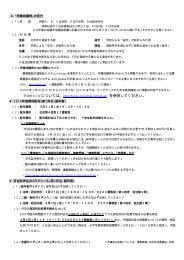
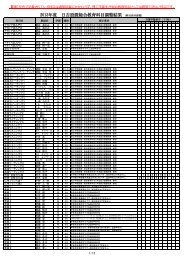
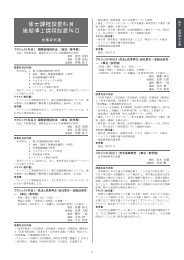
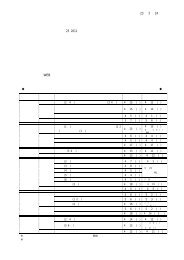
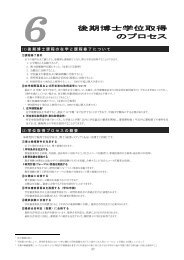
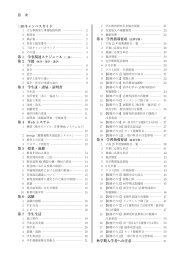



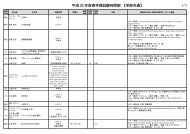

![文学部時間割表[2 ・3年生(07学則)]](https://img.yumpu.com/21046130/1/184x260/2-307.jpg?quality=85)

